You’re Not Tired—You’re Unrecovered (And That’s a Problem)
Sleep isn’t rest. Stretching isn’t recovery. Learn why your body is stuck in survival mode—and how to finally exit the burnout cycle.
REST + RECOVERY
Hank Cramblin
8/7/20252 min read


🧠 You’re Not Tired—You’re Unrecovered (And That’s a Problem)
1. The Lie of “Getting Enough Sleep”
You hit the pillow. Maybe even get 7–8 hours. And yet, you wake up feeling like you’ve been hit by a train. Why? Because sleep isn’t synonymous with recovery. Sleep is only restorative if your body isn't inflamed, overstimulated, or undernourished.
Recovery is not just the absence of movement. It’s a deliberate, biological state. One most modern people never enter, thanks to artificial light, chronic caffeine abuse, and nervous system overload. If your heart rate is still elevated, your muscles still tight, and your digestion still sluggish, guess what? You didn’t recover last night. You just paused.
2. The Nervous System You Forgot You Had
You’ve heard of fight or flight. But the real star of the show is its counterpart: rest and digest. Except for most people, this state is inaccessible. Your body can’t drop into recovery mode if you’re doom-scrolling before bed, skipping grounding activities, or living off of stimulants.
Chronic activation of the sympathetic nervous system—the stress mode—blocks true recovery. Your body isn’t broken, it’s just doing what it thinks it needs to survive. Unless you intentionally trigger parasympathetic responses (cold exposure, breathwork, nervous system regulation), you’ll stay stuck in the burnout loop.
3. The Culture of Anti-Recovery
Modern hustle culture glorifies the grind and gaslights fatigue. You’re taught that rest is weakness, indulgence, or laziness. Even “self-care” has become another performance metric—complete with overpriced candles and Instagram filters.
But recovery isn’t optional. It’s biological. Elite athletes train for recovery. And you should too. Your focus, hormonal balance, immune function, and longevity depend on it.
What if your constant tiredness isn’t a sign of aging—or depression—but just evidence that you haven’t recovered in years?
4. How to Actually Recover
Cut the fake stimulants: Swap coffee for adaptogens or herbal infusions that nourish, not spike.
Get sunlight immediately after waking to reset your circadian rhythm.
Build recovery windows into your day: tech-free 30-minute breaks, walk after meals, legs up the wall at night.
Prioritize sleep depth over hours: Use nasal breathing, magnesium, blackout curtains, and low room temps to drop into real sleep stages.
Regulate your nervous system daily—cold exposure, vagus nerve exercises, breathwork, somatic tools.
Recovery isn’t what happens when you stop. It’s what happens when you actively choose to restore.
